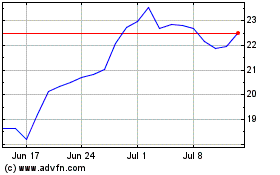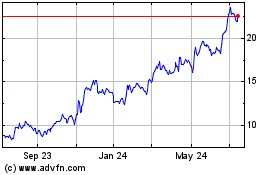By Paul Kiernan
RIO DE JANEIRO -- Brazilian authorities scrambled to contain the
fallout Monday from a police sting that has raised questions about
the safety of the nation's meat industry, as a growing number of
countries said they planned to suspend imports due to sanitary
concerns.
South Korea, the European Union and Chile took steps to bar meat
from either Brazil or specific companies accused by Brazilian
federal police Friday of bribing sanitary officials for health
certificates. Among the dozens of companies targeted in the probe
are some of the world's biggest producers and exporters of chicken
and beef, including JBS SA and BRF SA.
Both companies have disputed the accusations that they sold bad
meat or bribed officials.
Brazilian officials fear the police's accusations, that
meatpackers peddled rotten, salmonella-infested products, could
deal a setback to one of the country's most vibrant industries at a
time when the economy is fighting to recover from its deepest
recession on record. Brazil is the world's second-largest producer
of chicken and beef, trailing only the U.S., and meat products are
among its top exports.
Both here and abroad, consumers expressed concern about the
allegations. "We've been cheated if all of this is true," said
Patricio Buccioni, a 68-year-old taxi driver in Santiago, Chile,
who often buys Brazilian beef at the supermarket. Asked whether
he'll continue doing so in the future, Mr. Buccioni said, "I'm
going to be more careful."
GPA, Brazil's largest retail group, said in a note that it is
watching the scandal closely and "repudiates any practice that puts
at risk the health of its customers." The firm added that its
supermarkets conduct internal monitoring to guarantee the quality
of their meats.
The investigation, dubbed Weak Meat, took Brazil's leaders by
surprise and left them walking a fine line as they sought to calm
consumers and trade partners without appearing dismissive of the
findings.
President Michel Temer huddled with regulators, meat producers
and foreign officials Sunday to discuss the probe and reassure them
that Brazilian meat is safe. After a day of back-to-back meetings,
the president treated 19 ambassadors and eight foreign trade
officials to dinner at Steak Bull, a plush, all-you-can-eat grill
near the presidential palace.
Mr. Temer's office said in a statement Sunday night that all the
meat served at the dinner was of Brazilian origin, after local
media outlets reported that the restaurant specializes in imported
cuts.
In Twitter video featuring uplifting music and scenes of green
pastures, Mr. Temer said Brazil's meat producers have "won over
consumers and obtained approval from the most demanding markets in
terms of enforcement." Agriculture Minister Blairo Maggi, himself
the owner of huge tracts of farmland in Brazil's interior, said
that "the vast majority" of government workers are trustworthy,
noting that only 33 of the Agriculture Ministry's 11,000 employees
were cited in the police probe.
Talking to reporters on Sunday, Mr. Maggi said the government
supported the investigation but he criticized the federal police
for not clarifying some information with the ministry. For
instance, police highlighted the use of meat from pigs' heads in
sausages, a practice Mr. Maggi said is in fact legal in Brazil.
And some meat-loving Brazilians shrugged off the concerns.
"Yesterday, I had a barbecue with my family and friends," said
José Molina, a 57-year-old advertising worker, while preparing for
a meat-heavy lunch at a São Paulo steakhouse. "I think there's
exaggeration and that the situation will go back to normal
soon."
But several governments around the world expressed worry about
the situation, and industry officials were bracing for further
restrictions from export markets.
Enrico Brivio, spokesman for public health and food safety at
the European Commission, said Monday during a press briefing that
the bloc is moving to suspend imports from "any of the
establishments implicated in the fraud."
"We've asked our member states to remain vigilant and
increase...controls on meats coming from Brazil," Mr. Brivio said,
referring to "documentary and physical checks."
The Agriculture Ministry of Chile, one of Brazil's top-10 export
markets, said on Twitter that it had suspended imports of Brazilian
beef until it received further details.
South Korea's Ministry of Food and Drug Safety said it wouldn't
allow chicken already imported by BRF to be sold or circulate in
the country. And in Finland, the food safety authority said it had
launched its own investigation.
BRF said in a statement Monday that it hasn't been officially
notified by foreign or domestic authorities of any suspension by
countries where it does business.
Industry officials sought to play down the scandal by calling
the police's conclusions into question. Antonio Jorge Camardelli,
head of beef exporters' group ABIEC, said in a press conference
Monday the police based some of their allegations on technical
mistakes, saying an "unnecessary crisis" had resulted.
The biggest question going forward is how many countries move to
restrict Brazil's meat exports. China and Hong Kong, the largest
buyers of Brazilian meat, hadn't announced measures as of
Monday.
Neil Shearing, chief emerging markets economist at Capital
Economics, said that while it is too soon to know the full impact,
the scandal could "plausibly derail the country's economic
recovery" if it continues to grow. The biggest buyers of Brazilian
meat, China and Hong Kong, hadn't announced measures as of
Monday.
"It goes without saying that this is the last thing that
Brazil's economy needed," Mr. Shearing said.
Write to Paul Kiernan at paul.kiernan@wsj.com
(END) Dow Jones Newswires
March 20, 2017 14:32 ET (18:32 GMT)
Copyright (c) 2017 Dow Jones & Company, Inc.
BRF S/A ON (BOV:BRFS3)
Historical Stock Chart
From Mar 2024 to Apr 2024

BRF S/A ON (BOV:BRFS3)
Historical Stock Chart
From Apr 2023 to Apr 2024
